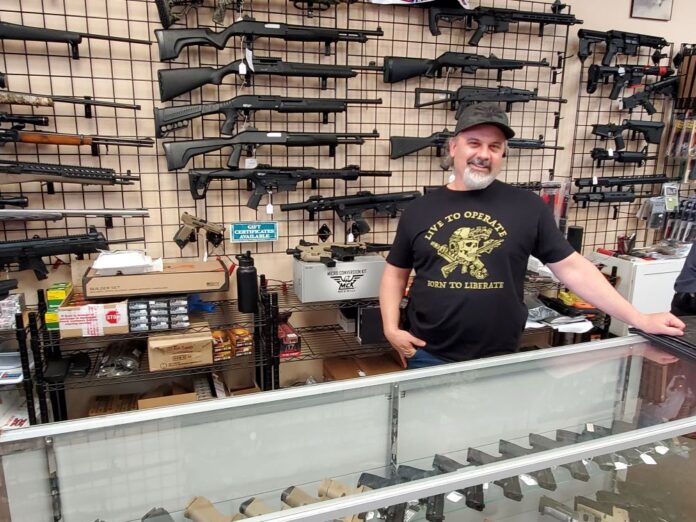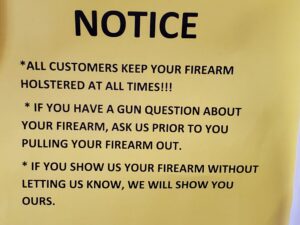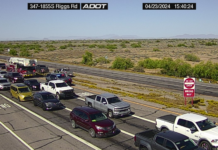
The COVID-19 pandemic changed everyday life, mainly for the worse. Small businesses were hit especially hard, with many industries such as restaurants, bars, hair and nail salons and tourism virtually shut down for much of the past year.
But one industry has thrived during this time – guns. Pistols, rifles and shotguns are selling in numbers never seen before. Shopkeepers can’t keep ammunition on the shelves – or in many cases, even get it to the shelves. And the FBI is running background checks at a record pace.
There are myriad reasons for the surge in gun purchases. The onset of coronavirus, with 30.2 million cases and nearly 600,000 deaths in the United States alone according to the World Health Organization, is a major factor. As people realized they would be locked down and forced to stay in their homes, many wanted to ensure their safety. And as fears of food and supply shortages (remember the run on toilet paper?) became a reality, others were looking to protect themselves against potential looting or theft.
Then in May 2020, the death of George Floyd at the hands of police in Minneapolis sparked national protests against brutality, racism and a lack of accountability for police. The fall brought a polarizing presidential election between two candidates with very different visions for the 2nd Amendment. As that played out with Joe Biden winning the election, many feared their ability to buy and own guns would be diminished or eliminated. And with the U.S. House passing two gun-control bills right out of the gate, those fears were enhanced.
RECORD PACE FOR SALES
According to the FBI, about 4.7 million background checks were initiated in March, a 36% increase from the previous month. More than 2 million of those checks were for new gun purchases, a spokesman for the National Shooting Sports Federation told CNN. NSSF is firearms industry trade group that compares FBI background check numbers with actual sales data to determine sales figures.
The rise was driven in a month marked by several mass shootings that served to revive the debate over gun control around the country. The number of new gun sales in March was second most ever in a month – after the estimated 2.3 million guns sold the previous March when the initial spread of COVID-19 spurred Americans to hoard guns, ammo, toilet paper and hand sanitizer.
Further stoking the fires were two gun control bills passed by Democrats on party-line votes in the House of Representatives to expand background checks to all gun sales and transfers at gun shows and in private transactions.
Ammunition sales in Maricopa have been skyrocketing since the virus hit initially early last year, according to Jake Lister, the store manager at Big 5 Sporting Goods in The Wells. He said it has been the same with firearms. Big 5 sells only rifles and shotguns, not handguns. He said the catalyst for the surge in gun or ammo sales is pretty obvious.
“What drove the start of all this? COVID,” he said emphatically. “In particular, the thought of economic collapse, when the economy tanked right after COVID started, then with the election it just kept going. And any time a Democrat has a chance to come into office, weapons and ammo sales always skyrocket, I guess with the paranoia of the potential of heavy gun restrictions.”
John Callaway, owner of the Arizona Law Dawgs gun store on West Hathaway Avenue, agreed the sustained surge can be traced to the pandemic.
“I didn’t really see a jump after recent shootings because all of last year was a jump,” he said. “People are afraid and want to protect themselves.”
Like Lister, Callaway noted that politics play a large role in the sale of both guns and ammo. After past mass shootings, he said, the debate usually centers around how Democrats want to make guns increasingly more difficult to get.
“The Democrats usually push their agenda hard after one of these things and preaching their agenda creates a lot of panic buying,” he said.
‘WE GET THE LEFTOVERS’
With demand at peak levels, securing guns for sale is becoming more difficult than selling it. Callaway said he sometimes feels like he’s making his living on a trading floor.
“I feel like a stockbroker, I have to be on the phone constantly in order to get product,” he said. “It’s not as easy as it was in 2019. Somebody comes in the door and wants a rifle or handgun, it’s not just the click of a button to see if we have it in inventory anymore. And that in return increases prices because of supply and demand. It’s just not as easy to get, so it involves a lot more work on my part and drives up the price.”

But the bigger issue for many gun shop owners is getting ammunition. Pearle Robertson, who opened Minuteman Supply at The Wells in January, said the two issues are tied to each other. There were millions of new gun buyers last year and there are millions this year already, she said.
“The thing about new gun buyers is they’re not just buying guns, they’re buying ammo and the manufacturers just can’t keep up with the demand,” said Robertson, a Navy veteran. “I’m so small and so new that when my reps do get something in, they go to the top-tier people first, then we get the leftovers.”
She said she is able to cobble together product from her many different suppliers to make it work. But last week Minuteman didn’t get anything.
Callaway said another factor is at work – the resale market for ammunition. With inventory tight and demand high, people are realizing that if they can buy up supplies at the big box stores, they can then turn around and resell it at double the retail price.
“When people are willing to do that, it causes problems,” he said. “You get everybody telling themselves that they can sell ammo on the side of the road for twice what they paid for it.”
Such enterprise hurts the small shops making it difficult to get ammo, he added.
To mitigate the supply issue, Callaway, whose store has been open nearly eight years, is only selling one of his most popular rounds, 9mm, to people who purchase a firearm. He said he hasn’t had 9mm hollow point rounds in more than a month.
Lister said that’s not likely to change in the foreseeable future for guns and ammo.
“It’s the perfect storm,” he said. “Manufacturers can’t produce enough guns to keep them in supply, and people are buying them because they’re so hard to get. They can’t get them to us fast enough, so supply is low, and demand is high, and demand is high because supply is low.”
Lister does get ammo on a weekly basis, but people are finding out about his schedule and doing whatever they need to in order to get their hands on some of the valuable rounds.
“Rumor has it the last couple weeks that the first guy in line always gets what he needs, but he’s here at 7 a.m.,” he said. “We open at 10 a.m. so he’s got a long cold morning of waiting.”

![MHS G.O.A.T. a ‘rookie sleeper’ in NFL draft Arizona Wildcats wide receiver Jacob Cowing speaks to the press after a practice Aug. 11, 2023. [Bryan Mordt]](https://www.inmaricopa.com/wp-content/uploads/2024/04/cowing-overlay-3-218x150.png)




![Maricopa’s ‘TikTok Rizz Party,’ explained One of several flyers for a "TikTok rizz party" is taped to a door in the Maricopa Business Center along Honeycutt Road on April 23, 2024. [Monica D. Spencer]](https://www.inmaricopa.com/wp-content/uploads/2024/04/spencer-042324-tiktok-rizz-party-flyer-web-218x150.jpg)





![Alleged car thief released without charges Phoenix police stop a stolen vehicle on April 20, 2024. [Facebook]](https://www.inmaricopa.com/wp-content/uploads/2024/04/IMG_5040-218x150.jpg)

![MHS G.O.A.T. a ‘rookie sleeper’ in NFL draft Arizona Wildcats wide receiver Jacob Cowing speaks to the press after a practice Aug. 11, 2023. [Bryan Mordt]](https://www.inmaricopa.com/wp-content/uploads/2024/04/cowing-overlay-3-100x70.png)


